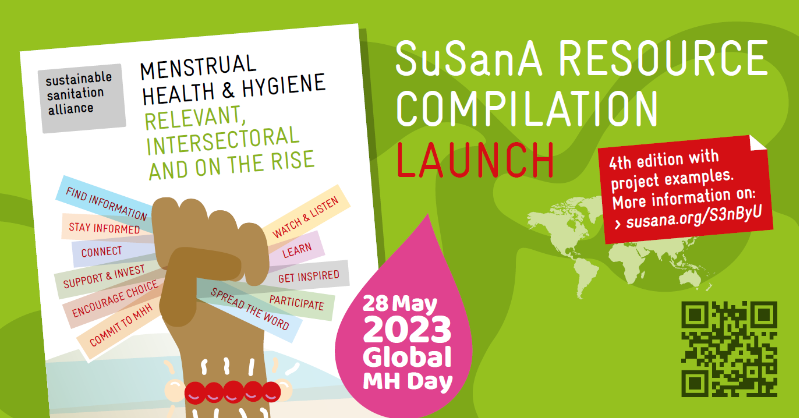- Forum
- categories
- Equity, inclusion and sanitation workers
- Menstrual health and hygiene (MHH) or Menstrual hygiene management (MHM)
- Awareness raising and reducing taboos
- Connect: Global Stakeholders
- Introduction to Connect: Global Stakeholders
Introduction to Connect: Global Stakeholders
1894 views
- secretariat
-
 Topic Author
Topic Author- Moderator
- SuSanA secretariat currently allocates 2 full time person equivalents of time from members of GIZ Sustainable Sanitation Team: Arne Panesar, Alexandra Dubois, Maren Heuvels, Teresa Häberlein, Daphne Manolakos and Bettina-Sophie Heinz.
If you’re seeking to connect with like-minded individuals, alliances, coalitions and groups that share your interest in MHH, there are numerous ways to do so. This can be a great opportunity to link up your efforts, learn from each other and continue to empower and motivate one another. The following networks are a great place to get started.
Global Menstrual Collective
The Global Menstrual Collective includes representatives from UN organizations, academia, governments, funders, the private sector, existing coalitions, advocacy groups, youth-focused organizations, religious groups, independent consultants, and international non-governmental organizations. The purpose of the Collective is to drive and guide investment in menstrual health and hygiene through evidence-based advocacy. Members of the Collective will work together to build the evidence and advocate for investment, policy, and programming across relevant sectors (WASH, health, education, gender, etc.), including access to information, products, and services, and establishing positive social norms and practices around menstruation.
👉 www.globalmenstrualcollective.org/who-we-are
African Coalition for Menstrual Health Management
The African Coalition for Menstrual Health Management is a coalition of individuals, groups and institutions. The aim is to strengthen coordination among key stakeholders in order to build on and support the evidence base and to improve the transition between research and action.
The focus is on supporting multi-sectoral policymaking and scaling up sustainable, evidence-based programmes in Africa that address the menstrual health needs of girls, women and all people who menstruate, throughout their menstrual lifecycle.
👉 acmhm.org
Global South Coalition for Dignified Menstruation
The mission of the Global South Coalition for Dignified Menstruation is to dismantle oppressive institutional, structural, interpersonal and social systems that currently have an impact on people who menstruate and on their ability to access basic inalienable human rights and critical resources which enable them to lead happy, healthy and dignified lives. The coalition strives to unite organizations and individuals who share their vision of reclaiming dignity for each individual during menstruation. Their aim is to transform the menstruation movement and make dignity a central focus.
👉 dignifiedmenstruation.org
Period Empowerment Network
The Period Empowerment Network seeks to strengthen the civic spirit and skills set of youth and youth workers in raising awareness on menstrual health, hygiene, and management. The network develops training programmes on planning, designing, delivering, and evaluating community and campaign-based interventions and strategies through non-formal educational practices in the field of youth education as a means of fostering menstrual health and hygiene education in youth work. The project contributes to the European Union’s Gender Action Plan: Gender Equality and Women’s Empowerment. PEN consists of 12 youth-based organizations across 12 countries. These organizations bring together the expertise of psychologists, sociologists, educators and youth workers involved in the field of health to challenge the stigma and taboos surrounding periods and to shape menstrual health education.
👉 terrampacis.org: bit.ly/433CHcK
Global Menstrual Collective
The Global Menstrual Collective includes representatives from UN organizations, academia, governments, funders, the private sector, existing coalitions, advocacy groups, youth-focused organizations, religious groups, independent consultants, and international non-governmental organizations. The purpose of the Collective is to drive and guide investment in menstrual health and hygiene through evidence-based advocacy. Members of the Collective will work together to build the evidence and advocate for investment, policy, and programming across relevant sectors (WASH, health, education, gender, etc.), including access to information, products, and services, and establishing positive social norms and practices around menstruation.
👉 www.globalmenstrualcollective.org/who-we-are
African Coalition for Menstrual Health Management
The African Coalition for Menstrual Health Management is a coalition of individuals, groups and institutions. The aim is to strengthen coordination among key stakeholders in order to build on and support the evidence base and to improve the transition between research and action.
The focus is on supporting multi-sectoral policymaking and scaling up sustainable, evidence-based programmes in Africa that address the menstrual health needs of girls, women and all people who menstruate, throughout their menstrual lifecycle.
👉 acmhm.org
Global South Coalition for Dignified Menstruation
The mission of the Global South Coalition for Dignified Menstruation is to dismantle oppressive institutional, structural, interpersonal and social systems that currently have an impact on people who menstruate and on their ability to access basic inalienable human rights and critical resources which enable them to lead happy, healthy and dignified lives. The coalition strives to unite organizations and individuals who share their vision of reclaiming dignity for each individual during menstruation. Their aim is to transform the menstruation movement and make dignity a central focus.
👉 dignifiedmenstruation.org
Period Empowerment Network
The Period Empowerment Network seeks to strengthen the civic spirit and skills set of youth and youth workers in raising awareness on menstrual health, hygiene, and management. The network develops training programmes on planning, designing, delivering, and evaluating community and campaign-based interventions and strategies through non-formal educational practices in the field of youth education as a means of fostering menstrual health and hygiene education in youth work. The project contributes to the European Union’s Gender Action Plan: Gender Equality and Women’s Empowerment. PEN consists of 12 youth-based organizations across 12 countries. These organizations bring together the expertise of psychologists, sociologists, educators and youth workers involved in the field of health to challenge the stigma and taboos surrounding periods and to shape menstrual health education.
👉 terrampacis.org: bit.ly/433CHcK
Posted by a member of the SuSanA secretariat held by the GIZ Sector Program Water Policy – Innovations for Resilience
Located at Deutsche Gesellschaft für Internationale Zusammenarbeit (GIZ) GmbH, Bonn, Germany
Follow us on facebook: www.facebook.com/susana.org, linkedin: www.linkedin.com/company/sustainable-sanitation-alliance-susana.
Located at Deutsche Gesellschaft für Internationale Zusammenarbeit (GIZ) GmbH, Bonn, Germany
Follow us on facebook: www.facebook.com/susana.org, linkedin: www.linkedin.com/company/sustainable-sanitation-alliance-susana.
Attachments:
Please Log in to join the conversation.
You need to login to reply
Share this thread:
- Forum
- categories
- Equity, inclusion and sanitation workers
- Menstrual health and hygiene (MHH) or Menstrual hygiene management (MHM)
- Awareness raising and reducing taboos
- Connect: Global Stakeholders
- Introduction to Connect: Global Stakeholders
Recently active users. Who else has been active?
Time to create page: 0.184 seconds








